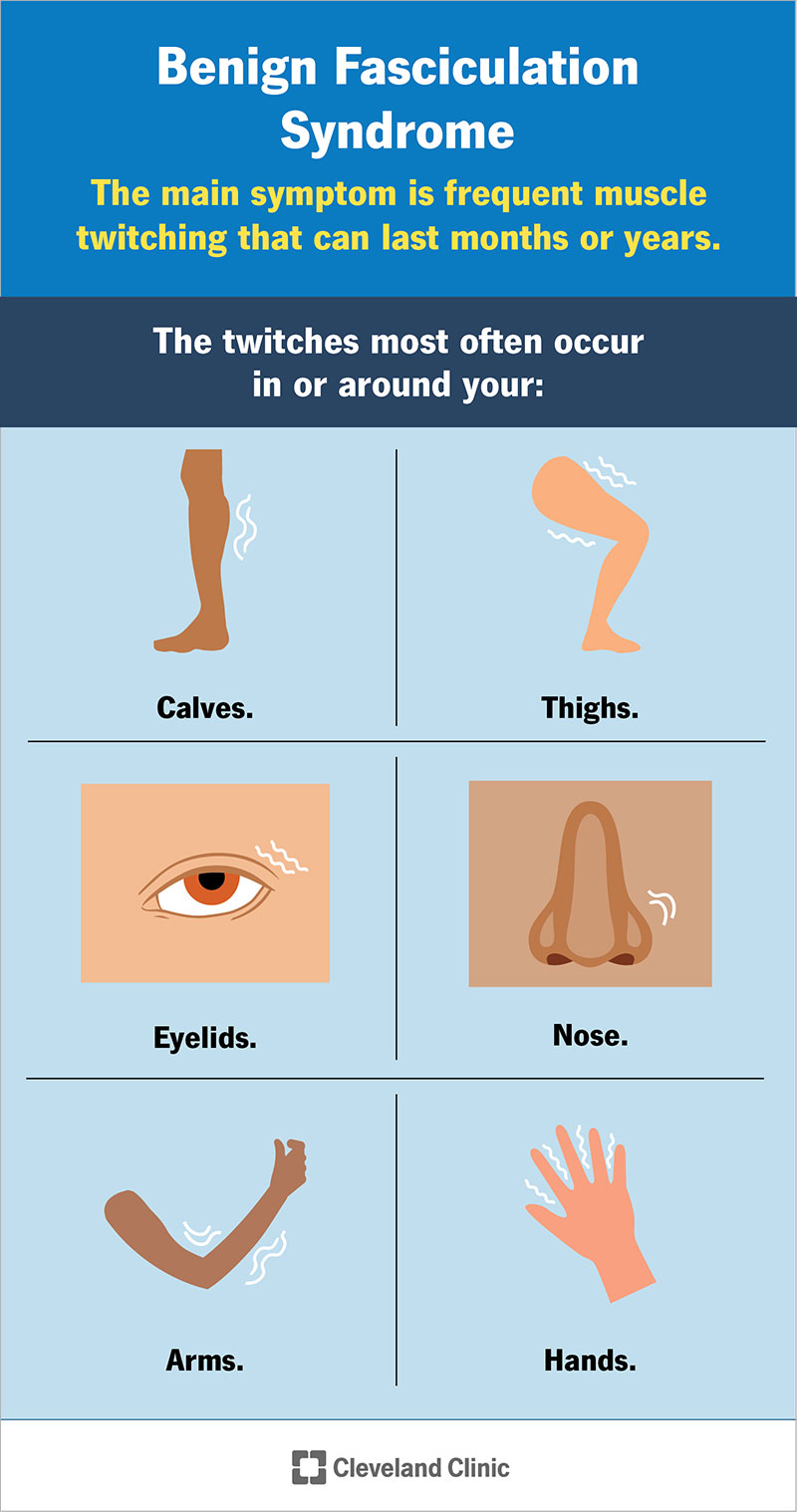Benign fasciculation syndrome happens when you experience continual muscle twitches without having an underlying medical condition. While the twitches can be annoying, they’re harmless. If you develop other muscle-related symptoms, such as muscle weakness and atrophy, it’s important to see a healthcare provider.
Advertisement
Cleveland Clinic is a non-profit academic medical center. Advertising on our site helps support our mission. We do not endorse non-Cleveland Clinic products or services. Policy
Benign fasciculation syndrome (BFS) is a condition in which you experience frequent muscle twitches without having any kind of underlying medical condition.
Advertisement
Cleveland Clinic is a non-profit academic medical center. Advertising on our site helps support our mission. We do not endorse non-Cleveland Clinic products or services. Policy
Fasciculation (pronounced “fass-ick-you-lay-shun”) is a visible, involuntary twitching of an individual muscle. It doesn’t hurt and can last for several seconds, minutes or even hours. The twitches may be annoying or distracting, but they don’t cause harm.
While most people experience muscle twitches every once in a while, people with benign fasciculation syndrome experience muscle twitches frequently over several months.
Amyotrophic lateral sclerosis (ALS) is a degenerative neurological disease. It’s also known as Lou Gehrig’s disease. ALS affects motor neurons — nerves that control your voluntary muscles. One common symptom of ALS is muscle twitching (fasciculation). Other symptoms include:
Symptoms of ALS get worse over time, and this condition ultimately causes complications that are fatal.
Benign fasciculation syndrome involves just muscle twitching and no other symptoms. The fasciculations in BFS usually occur at a single site in a single muscle at a time. In ALS, the fasciculations are more likely to occur in multiple muscles at the same time.
Although frequent muscle twitches could be an early sign of ALS, most people who have benign fasciculation syndrome don’t develop ALS.
Advertisement
Benign fasciculation syndrome can affect anyone.
Benign fasciculations (muscle twitches) are common. They occur in about 70% of healthy people at some point in their lives. Benign fasciculation syndrome, however, is relatively rare.

Image content: This image is available to view online.
View image online (https://my.clevelandclinic.org/-/scassets/images/org/health/articles/24812-benign-fasciculation-syndrome)
The main symptom of benign fasciculation syndrome (BFS) is frequent muscle twitching. The twitching happens when your muscle is at rest (relaxed). The twitches can last for months or even years.
The twitches can occur anywhere in your body, but they most often occur in or around your:
Some people with BFS also experience muscle cramps. This is known as cramp-fasciculation syndrome (CFS).
Fasciculation (muscle twitching) happens when a single peripheral nerve that controls a muscle is overactive, resulting in involuntary muscle movement.
Researchers don’t know the exact cause of benign fasciculation syndrome. But they know that muscle twitches are associated with the following:
You’ll likely need to see a neurologist to receive a benign fasciculation syndrome (BFS) diagnosis.
Neurologists diagnose benign fasciculation syndrome based on your symptoms and normal findings of the following tests:
In other words, a provider has to rule out all possible medical causes (such as neurological conditions) of the frequent muscle twitches. If you have no other signs of these conditions, the provider will likely diagnose you with benign fasciculation syndrome.
As the muscle twitches in benign fasciculation syndrome (BFS) aren’t a part of an underlying condition and they’re “harmless,” there’s no specific treatment for the syndrome.
Your healthcare provider may recommend trying to lessen or avoid possible triggers of muscle twitches, such as stress, caffeine and strenuous exercise.
There’s limited research on the effectiveness of certain medications for BFS. Some research has shown that the following medications may help:
BFS often causes anxiety, as muscle twitches can be a sign of serious neurological conditions like ALS. Anxiety can also be a trigger of muscle twitches, which can worsen or prolong BFS. Because of this, it’s important to talk to your provider or a mental health professional if you’re experiencing anxiety.
Advertisement
Researchers don’t know why some people develop BFS while others don’t, so there isn’t anything you can do to prevent it.
If you’re having frequent muscle twitches, talk to a healthcare provider — especially if you’re experiencing other muscle-related symptoms like weakness.
If you’ve been diagnosed with benign fasciculation syndrome, your provider may recommend following up with them regularly to make sure you don’t develop any other symptoms of an underlying condition.
It may be helpful to ask your healthcare provider the following questions:
Constant muscle twitches can be annoying and become concerning. The good news is that experiencing frequent muscle twitches without any other symptoms is usually harmless (benign fasciculation syndrome). If the twitches are bothering you or causing anxiety, talk to a healthcare provider. If you suddenly develop other symptoms, such as muscle weakness, cramps and fatigue, see a provider as soon as possible.
Advertisement

Sign up for our Health Essentials emails for expert guidance on nutrition, fitness, sleep, skin care and more.
Learn more about the Health Library and our editorial process.
Cleveland Clinic’s health articles are based on evidence-backed information and review by medical professionals to ensure accuracy, reliability and up-to-date clinical standards.
Cleveland Clinic’s health articles are based on evidence-backed information and review by medical professionals to ensure accuracy, reliability and up-to-date clinical standards.
Cleveland Clinic’s primary care providers offer lifelong medical care. From sinus infections and high blood pressure to preventive screening, we’re here for you.
